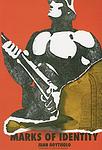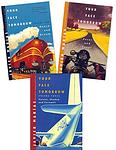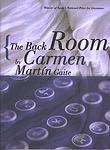The Greatest Czech, Spanish "Fiction" Books Since 1950
Click to learn how this list is calculated.
This list represents a comprehensive and trusted collection of the greatest books. Developed through a specialized algorithm, it brings together 300 'best of' book lists to form a definitive guide to the world's most acclaimed books. For those interested in how these books are chosen, additional details can be found on the rankings page.
Genres
Countries
Date Range
Reading Statistics
Click the button below to see how many of these books you've read!
Download
If you're interested in downloading this list as a CSV file for use in a spreadsheet application, you can easily do so by clicking the button below. Please note that to ensure a manageable file size and faster download, the CSV will include details for only the first 500 books.
Download-
1. The Unbearable Lightness of Being by Milan Kundera
Set against the backdrop of the Prague Spring period of Czechoslovak history, the novel explores the philosophical concept of Nietzsche's eternal return through the intertwined lives of four characters: a womanizing surgeon, his intellectual wife, his naïve mistress, and her stoic lover. The narrative delves into their personal struggles with lightness and heaviness, freedom and fate, love and betrayal, and the complexities of human relationships, all while offering a profound meditation on the nature of existence and the paradoxes of life.
-
2. Franz Kafka: The Complete Stories by Franz Kafka
This collection of stories offers a comprehensive look at the work of a renowned author, known for his surreal and often unsettling depictions of modern life. The stories explore themes of existential anxiety, guilt, and absurdity, often through narratives in which ordinary people face extraordinary, inexplicable circumstances. The collection showcases the author's unique style and his profound influence on 20th-century literature.
-
3. The Book of Laughter and Forgetting by Milan Kundera
This novel is a blend of fiction, autobiography, and philosophical musings that explores the nature of forgetting, the power of laughter, and the struggle for personal and political freedom. Set against the backdrop of the political turmoil in Czechoslovakia in the 20th century, it follows the interconnected stories of various characters, including a man who is expelled from the Communist Party, a young woman in love with a man whose father was a political prisoner, and a couple who flee to America. Throughout, the book delves into the ways in which personal and collective memories shape identity and history.
-
4. The Shadow of the Wind by Carlos Ruiz Zafon
The novel follows the story of a young boy in post-war Barcelona, who discovers a mysterious book in a hidden library that his father takes him to, which houses forgotten books. The boy becomes captivated by the book and its author, but as he grows older, he realizes that someone is destroying all books written by this author. As he delves deeper into the mystery, the boy's life becomes intertwined with the author's, revealing a dark and tragic past that someone wants to be kept hidden. The story is a mix of romance, mystery, and a historical narrative set against the turbulent backdrop of a city recovering from war.
-
5. The Hive by Camilo José Cela
"The Hive" is a novel set in post-Civil War Spain, during the harsh years of Madrid's postwar recovery. It provides a gritty and realistic portrayal of the struggles faced by ordinary citizens in a society marked by deprivation and repression. The narrative is non-linear and fragmented, featuring a vast array of characters from various social classes, whose lives intertwine in a depiction of the bleakness and despair of the time. The book was initially banned in Spain due to its critical view of Franco's regime.
-
6. The Joke by Milan Kundera
"The Joke" follows the life of Ludvik Jahn, a man expelled from the Czechoslovak Communist Party, his university, and the army for a harmless joke he sends in a postcard to a girlfriend. The narrative explores his life before, during, and after his punishment, and his attempts to exact revenge on those who wronged him. Set against the backdrop of the Prague Spring and the Soviet Invasion, the novel delves into the themes of political satire, the absurdity of totalitarianism, and the individual's struggle against an impersonal and oppressive system.
-
7. A Heart So White by Javier Marías
The novel delves into the complexities of relationships, secrets, and communication as the protagonist, a translator and interpreter, grapples with the mysterious suicide of his father's first wife and the pervasive silence surrounding it. Through his own marriage and his observations of others', he contemplates the unsaid and the power of words, both spoken and unspoken. The narrative weaves through time and memory, exploring the impact of the past on the present and the intricate ways in which people understand and misunderstand each other.
-
8. The Time Of The Doves by Merce Rodoreda
The novel is a poignant exploration of a woman's life set against the backdrop of the Spanish Civil War and the early years of Franco's dictatorship. Through the eyes of the protagonist, a shopkeeper in Barcelona, readers experience her struggles with love, loss, and survival. Her personal journey is interwoven with the turbulent history of the era, as she endures the hardships of war, the complexities of her romantic relationships, and the challenges of raising her children alone. The narrative, rich with symbolic imagery, particularly the recurring motif of doves, offers a deeply emotional and intimate portrayal of resilience amidst the chaos of societal upheaval.
-
9. Closely Watched Trains by Bohumil Hrabal
"Closely Watched Trains" is a darkly humorous tale set in Nazi-occupied Czechoslovakia during World War II. It follows the life of a young, inexperienced railway worker who is struggling with his sexual awakening while dealing with the harsh realities of war. The novel is a poignant exploration of the absurdity of life, the tragicomedy of human existence, and the power of ordinary people to resist oppression.
-
10. I Served The King Of England by Bohumil Hrabal
"I Served The King Of England" is a captivating novel that follows the life of a young Czech waiter named Ditie, who dreams of becoming a millionaire and serving the highest-ranking clientele. Set against the backdrop of World War II and the Communist regime, the story takes readers on a journey through Ditie's experiences in various hotels and restaurants, his encounters with eccentric characters, and his pursuit of love and success. With humor, wit, and a touch of satire, the book explores themes of ambition, identity, and the impact of historical events on an individual's life.
-
11. The Club Dumas by Arturo Pérez-Reverte
The book follows Lucas Corso, a book detective who is hired to authenticate a rare manuscript by Alexandre Dumas. As he delves into the investigation, he finds himself entangled in a mystery involving two other books: a rare edition of "The Three Musketeers" and a satanic text, "The Book of Nine Doors of the Kingdom of Shadows". The narrative becomes a complex puzzle as Corso uncovers connections between the books, while also dealing with a seductive woman who seems to have stepped out of a Dumas novel, a mysterious killer, and a group of bibliophiles obsessed with Dumas. The lines between fiction and reality blur as he gets closer to the truth.
-
12. Bartleby & Co by Enrique Vila-Matas
"Bartleby & Co" is a metafictional work that explores the theme of "writers of the No," authors who cease to write or never start at all. The narrator, an office worker on sick leave, uses footnotes to a nonexistent text to delve into the stories of these authors, including famous real-life figures. The book serves as a meditation on silence, refusal, and the nature of literature itself.
-
13. Marks of Identity by Juan Goytisolo
This novel follows the life of Alvaro Mendiola, a Spanish man returning to his homeland after a long period of self-imposed exile in France. Through his experiences and memories, the narrative paints a vivid picture of the socio-political climate in Spain under Franco's dictatorship. As Alvaro grapples with his identity, the book explores themes of personal and national identity, exile, and the struggle for freedom.
-
14. Memoirs of a Peasant Boy by Xosé Neira Vilas
"Memoirs of a Peasant Boy" is a poignant narrative about the harsh realities of rural life in Galicia, Spain during the early 20th century, as seen through the eyes of a young boy. The protagonist, who is also the narrator, offers a vivid depiction of his experiences growing up in poverty, dealing with oppressive landlords, and struggling for survival and education. This autobiographical novel is a powerful commentary on social injustice and the enduring spirit of the human will.
-
15. Time of Silence by Luis Martín-Santos
"Time of Silence" is a complex narrative that follows the life of a young doctor living in Madrid during the Franco regime. Throughout the novel, he becomes embroiled in a series of unfortunate events, including an affair with a married woman, which leads to tragic consequences. The novel is known for its innovative narrative techniques and its critical depiction of the moral and political climate of Spain under Franco's rule.
-
16. Your Face Tomorrow: Fever and Spear by Javier Marías
The novel explores the life of a Spanish expatriate in England who is recruited by a secretive organization due to his unique ability to interpret people's behavior. As he becomes entangled in a world of espionage, he grapples with moral and ethical dilemmas, questioning the validity of his work and the consequences of his actions. Through a blend of introspective musings and suspenseful narrative, the protagonist's life unravels, revealing a complex web of deceit, betrayal, and violence.
-
17. Last Evenings with Teresa by Juan Marse
The novel revolves around a young, ambitious man from the lower class who is obsessed with breaking into the higher social strata of Barcelona. He believes that his ticket to this higher society is through seducing Teresa, a naive, young girl from a well-off family. As he manipulates Teresa, he finds himself entangled in a web of deceit, lies, and unexpected feelings. The story is a gritty exploration of class, ambition, and the lengths people will go to achieve their desires.
-
18. The Engineer of Human Souls by Josef Škvorecký
The novel is a semi-autobiographical narrative of a Czechoslovakian writer who has become a professor at a Canadian university, teaching American literature. The narrative switches between his current life in Canada and his memories of the past in Czechoslovakia, including the Nazi occupation and the Communist regime. The book presents a complex portrayal of the life of an intellectual in exile and the challenges of cultural assimilation, while also exploring themes of love, politics, and the power of literature.
-
19. The Back Room by Carmen Martín Gaite
"The Back Room" is a surreal narrative that blurs the lines between reality and imagination. The story revolves around a female writer who is visited by a mysterious stranger in the middle of the night. The stranger triggers a series of memories and dreams, transporting her back to her childhood during the Spanish Civil War. As the protagonist delves deeper into her past, she begins to question the nature of her reality, resulting in a psychological exploration of memory, identity, and the power of storytelling.
-
20. Southern Seas by Manuel Vázquez Montalbán
"Southern Seas" is a detective novel set in post-Franco Barcelona. The story revolves around a private detective who is hired to investigate the mysterious disappearance of a wealthy man. As he delves deeper into the case, he finds himself entangled in a web of corruption, violence, and deceit, revealing a dark underbelly of the city's elite society. The narrative is deeply political and social, exploring themes of power, class, and the legacy of Franco's dictatorship in Spain.
-
21. Larva: Midsummer Night's Babel by Julián Ríos
"Larva: Midsummer Night's Babel" is a complex and innovative novel that explores the nature of language and the power of words. It's a narrative labyrinth that follows a group of characters through the streets of London on a midsummer night, as they engage in a series of intellectual debates and discussions. The story is filled with puns, word games, and literary references, and is written in a unique style that blends poetry and prose. The novel is also a satire of the literary world, with the characters often critiquing and parodying various literary styles and authors.
-
22. Too Loud A Solitude by Bohumil Hrabal
The narrative centers around an elderly man who has spent his life compacting paper and books into bales in a decrepit cellar, using a hydraulic press. Despite the menial nature of his job, he has cultivated a deep love and profound knowledge for literature, philosophy, and art from the books that pass through his hands, many of which he rescues from destruction. The story is a poignant exploration of the power and resilience of the human spirit in the face of a dehumanizing, totalitarian regime, and a meditation on the enduring value of art and the written word. The protagonist's intellectual journey and his resistance to the oppressive forces around him serve as a metaphor for the survival of culture and individuality under oppressive conditions.
-
23. Cutting It Short by Bohumil Hrabal
Set in a small Czech town during the 1920s, the narrative follows the life of a vivacious and free-spirited young woman married to the town's brewery manager. Her playful and unconventional behavior often leads to humorous and sometimes scandalous situations, as she navigates through the social norms and expectations of the time. The story captures the charm and eccentricities of rural life through a series of anecdotes, reflecting on the themes of freedom, tradition, and the joy of the everyday. The protagonist's zest for life and her interactions with the colorful cast of characters create a whimsical and endearing portrait of a community on the brink of modernization.
-
24. Obabakoak by Bernardo Atxaga
Obabakoak is a collection of interconnected stories that revolve around the inhabitants of a fictional Basque village named Obaba. The stories, which are a blend of the magical and the everyday, explore the complexities of human nature, as well as the rich history and culture of the Basque region. Themes of love, fear, tradition, and change are woven throughout, offering a nuanced and evocative portrait of a community and its people.
-
25. All Souls by Javier Marías
"All Souls" is a novel that follows the experiences of a Spanish professor teaching at Oxford University. His life is filled with eccentric colleagues, a puzzling love affair, and a mysterious sense of intrigue. As the protagonist navigates through the academic world, he becomes entangled in a web of personal relationships and bureaucratic intricacies. The book is a blend of romance, suspense, and satire, with a poignant exploration of memory, longing, and the ephemeral nature of human relationships.
Reading Statistics
Click the button below to see how many of these books you've read!
Download
If you're interested in downloading this list as a CSV file for use in a spreadsheet application, you can easily do so by clicking the button below. Please note that to ensure a manageable file size and faster download, the CSV will include details for only the first 500 books.
Download























